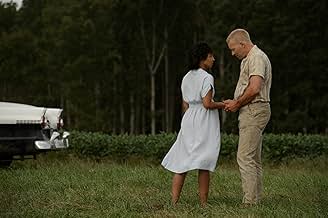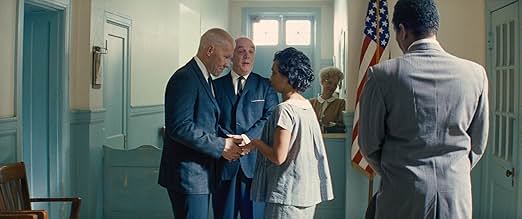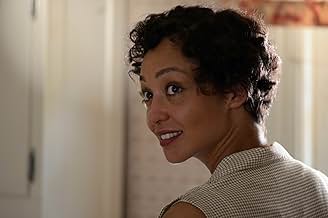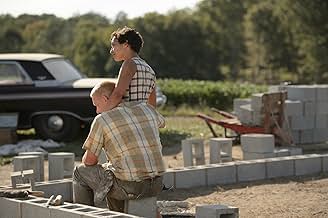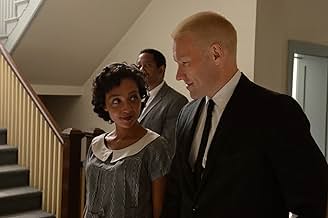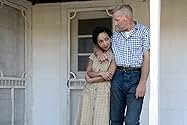AVALIAÇÃO DA IMDb
7,0/10
38 mil
SUA AVALIAÇÃO
Relata a história de amor de Richard e Mildred, um casal cuja detenção por casamento inter-racial nos anos 60 na Virgínia iniciou uma batalha legal que terminaria com a histórica decisão de ... Ler tudoRelata a história de amor de Richard e Mildred, um casal cuja detenção por casamento inter-racial nos anos 60 na Virgínia iniciou uma batalha legal que terminaria com a histórica decisão de 1967 na Suprema Corte.Relata a história de amor de Richard e Mildred, um casal cuja detenção por casamento inter-racial nos anos 60 na Virgínia iniciou uma batalha legal que terminaria com a histórica decisão de 1967 na Suprema Corte.
- Indicado a 1 Oscar
- 25 vitórias e 91 indicações no total
Chris Greene
- Percy
- (as Chris R. Greene)
- Direção
- Roteiristas
- Elenco e equipe completos
- Produção, bilheteria e muito mais no IMDbPro
Avaliações em destaque
This could have been a much more interesting film if: 1- we got more backstory on how they met and if they considered the dangers and difficulties of being an inter-racial couple 2- there were fewer long"meaningful" pauses. I started to get impatient as another five minutesof silent stares went by. 3 - the events were compressed so that muchmore time was given to both the state and federal court proceedings 4- much more of the actual Supreme Court case was shown. The Lovings didn't want to attend the court proceedings, but *I* did! I wanted to hear the arguments on both sides and comments of the judges. I wanted to get a glimpse into the thinking of the time. Surely all of this is available.
Nice scenery, good score, and for those of us who remember the '60s, lots of shirtwaist dresses and plaid shirts. The two main characters are excellent actors, especially the female lead. But overall, it's very very slow going with almost no passionate arguments about the heart of the matter: why miscegenation laws were on the books at all. Can't really recommended it whole-heartedly.
Nice scenery, good score, and for those of us who remember the '60s, lots of shirtwaist dresses and plaid shirts. The two main characters are excellent actors, especially the female lead. But overall, it's very very slow going with almost no passionate arguments about the heart of the matter: why miscegenation laws were on the books at all. Can't really recommended it whole-heartedly.
'Loving' was outstanding. I know I review a lot of films that star a person people I love, but this film was one of the best ones I saw this year (Moonlight. GO SEE IT). I hesitated even writing that, thinking it couldn't be true, but it was. I was emotionally vested, riveted and compelled by it. Jeff Nichols' did a beautiful job directing this film in its fantastic simplicity, allowing Ruth Negga and Joel Edgerton to deliver stellar performances as Mildred & Richard Loving. Joel Edgerton specifically stood out to me as I was a fan of his since King Arthur with Clive Owen (love Clive to death, but it was bad) and I absolutely love seeing him on film. He was remarkable as Richard Loving, communicating so much with his eyes and body language, I think it was a role that challenged him and I appreciate the impeccable job he did. Equally talented, Ruth Negga was also outstanding as Mildred Loving. She communicated so much just through her eyes! She is a very talented young woman who will have one outstanding career ahead of her. Marton Csokas and Michael Shannon make short but memorable appearances, honesty though both men are superbly talented so it's a real treat to have them pop up in smaller roles. Fun fact: Jeff Nichols directed Michael Shannon in another film I really liked, "Take Shelter".
This film is about two people in love, an understated but very deep love which altered the very course of American history. 'Loving' begins in the late 1950s, right when racial tension was at its highest, just as the Civil Rights Movement was gaining momentum. Compounded by this and social pressures from within their community, the Lovings were forced to live in fear and even meet under cover of night. No one should have to live like this, ever. Nichols did a wonderful job of illustrating just how much this impacted their lives. How this couple, who only wanted to have a family and be together in peace, lived in a persistent state of paranoia fearing violence or worse just because they loved each other. It really is beyond all comprehension, that a black woman and a white male would be violating law simply being married. That tune sounds very familiar doesn't it, when likened to present day? All those lovely gay couples who can't hold hands just because they are scared that you are unable to mind your own damn business. Such a shame.
'Loving' is also about hope. The beautiful glory of hope and love. Even despite everything, all the adversity and hardship there is always hope. That was one thing I really took away from the film. When asked how she is able to keep fighting, Mildred Loving, played by the wonderful Ruth Negga, says: Well, you loose the small battles to win the big war." This film is also about freedom, liberty and rights. This is the land of the free after all, but only free if you're not black, or gay, or anything not considered the status quo. The Lovings fought for years tooth and nail for the right to be able to love each other and raise a family the poignant part of this film to me is the ridiculous fact that they had to endure years of crap for something they should've had all along.
Overall the film was just wonderful, I was moved and felt it in a very real way. The story is palpable from many perspectives which I think was a pretty challenging feat for Nichols accomplish, but he did so with efficacy. The narrative is clear: Love is love, live and let live. I say go see it, fall in love and carry it with you.
This film is about two people in love, an understated but very deep love which altered the very course of American history. 'Loving' begins in the late 1950s, right when racial tension was at its highest, just as the Civil Rights Movement was gaining momentum. Compounded by this and social pressures from within their community, the Lovings were forced to live in fear and even meet under cover of night. No one should have to live like this, ever. Nichols did a wonderful job of illustrating just how much this impacted their lives. How this couple, who only wanted to have a family and be together in peace, lived in a persistent state of paranoia fearing violence or worse just because they loved each other. It really is beyond all comprehension, that a black woman and a white male would be violating law simply being married. That tune sounds very familiar doesn't it, when likened to present day? All those lovely gay couples who can't hold hands just because they are scared that you are unable to mind your own damn business. Such a shame.
'Loving' is also about hope. The beautiful glory of hope and love. Even despite everything, all the adversity and hardship there is always hope. That was one thing I really took away from the film. When asked how she is able to keep fighting, Mildred Loving, played by the wonderful Ruth Negga, says: Well, you loose the small battles to win the big war." This film is also about freedom, liberty and rights. This is the land of the free after all, but only free if you're not black, or gay, or anything not considered the status quo. The Lovings fought for years tooth and nail for the right to be able to love each other and raise a family the poignant part of this film to me is the ridiculous fact that they had to endure years of crap for something they should've had all along.
Overall the film was just wonderful, I was moved and felt it in a very real way. The story is palpable from many perspectives which I think was a pretty challenging feat for Nichols accomplish, but he did so with efficacy. The narrative is clear: Love is love, live and let live. I say go see it, fall in love and carry it with you.
Greetings again from the darkness. Imagine you are sound asleep in bed with your significant other. It's the middle of the night. Suddenly, the sheriff and his deputies crash through your bedroom door with pistols drawn and flashlights blinding you. You are both taken into custody. For most of us, this would be a terrible nightmare. For Mildred and Richard Loving, it was their reality in June of 1958. Their crime was not drug-dealing, child pornography, or treason. Their crime was marriage. Interracial marriage.
Writer/director Jeff Nichols (Mud, Take Shelter) proves again he has a distinct feel and sensitivity for the southern way. There is nothing showy about his style, and in fact, his storytelling is at its most effective in the small, intimate moments he goes quiet where other filmmakers would go big. Rather than an overwrought political statement, Nichols keeps the focus on two people just trying to live their life together.
Joel Edgerton plays Richard Loving, a bricklayer and man of few words. Ruth Negga plays Mildred, a quietly wise and observant woman. Both are outstanding in delivering understated and sincere performances (expect Oscar chatter for Ms. Negga). These are country folks caught up in Virginia's Racial Integrity Act of 1924, though as Richard says, "we aren't bothering anyone". The counterpoint comes from the local Sheriff (an intimidating Martin Csokas) who claims to be enforcing "God's Law".
Nichols never strays far from the 2011 documentary The Loving Story from Nancy Buirski, who is a producer on this film. When the ACLU-assigned young (and green) lawyer Bernard Cohen (played with a dose of goofiness by Nick Kroll) gets involved, we see how the case hinges on public perception and changing social mores. Michael Shannon appears as the Life Magazine photographer who shot the iconic images of the couple at home a spread that presented the Lovings not as an interracial couple, but rather as simply a normal married couple raising their kids.
In 1967, the Supreme Court decision in Loving v. Virginia, unanimously held Virginia's "Racial Integrity Act of 1924" as unconstitutional, putting an end to all miscegenation laws (interracial marriage was still illegal in 15 states at the time). In keeping with the film's direct approach, the Supreme Court case lacks any of the usual courtroom theatrics and is capped with a quietly received phone call to Mildred.
Beautiful camera work from cinematographer Adam Stone complements the spot on setting, costumes and cars which capture the look and feel of the era (over a 10 year period). Nichols forsakes the crowd-rallying moments or even the police brutality of today's headlines, but that doesn't mean there is any shortage of paranoia or constant concern. We feel the strain through these genuine people as though we are there with them. The simplicity of Richard and Mildred belies the complexity of the issue, and is summed up through the words of Mildred, "He took care of me."
Writer/director Jeff Nichols (Mud, Take Shelter) proves again he has a distinct feel and sensitivity for the southern way. There is nothing showy about his style, and in fact, his storytelling is at its most effective in the small, intimate moments he goes quiet where other filmmakers would go big. Rather than an overwrought political statement, Nichols keeps the focus on two people just trying to live their life together.
Joel Edgerton plays Richard Loving, a bricklayer and man of few words. Ruth Negga plays Mildred, a quietly wise and observant woman. Both are outstanding in delivering understated and sincere performances (expect Oscar chatter for Ms. Negga). These are country folks caught up in Virginia's Racial Integrity Act of 1924, though as Richard says, "we aren't bothering anyone". The counterpoint comes from the local Sheriff (an intimidating Martin Csokas) who claims to be enforcing "God's Law".
Nichols never strays far from the 2011 documentary The Loving Story from Nancy Buirski, who is a producer on this film. When the ACLU-assigned young (and green) lawyer Bernard Cohen (played with a dose of goofiness by Nick Kroll) gets involved, we see how the case hinges on public perception and changing social mores. Michael Shannon appears as the Life Magazine photographer who shot the iconic images of the couple at home a spread that presented the Lovings not as an interracial couple, but rather as simply a normal married couple raising their kids.
In 1967, the Supreme Court decision in Loving v. Virginia, unanimously held Virginia's "Racial Integrity Act of 1924" as unconstitutional, putting an end to all miscegenation laws (interracial marriage was still illegal in 15 states at the time). In keeping with the film's direct approach, the Supreme Court case lacks any of the usual courtroom theatrics and is capped with a quietly received phone call to Mildred.
Beautiful camera work from cinematographer Adam Stone complements the spot on setting, costumes and cars which capture the look and feel of the era (over a 10 year period). Nichols forsakes the crowd-rallying moments or even the police brutality of today's headlines, but that doesn't mean there is any shortage of paranoia or constant concern. We feel the strain through these genuine people as though we are there with them. The simplicity of Richard and Mildred belies the complexity of the issue, and is summed up through the words of Mildred, "He took care of me."
A few weeks ago when I reviewed "Hidden Figures" I pointed out the how absurd the racist behaviour at NASA in the 60's must have appeared to a young boy in the audience at my screening. In many ways, "Loving" – a film that has had a lot less publicity and is a less obvious 'crowd-pleaser' – makes a useful companion piece to that film.
It tells the true story (yes, yet ANOTHER 'true story'!) of Richard and Mildred Loving who travelled from their home town of Central Point Virginia to Washington DC where – as a mixed race couple – they could legally get married.
However, on returning to their home state and living together as man and wife, they fell foul of the State's repulsive antimiscegenation statute which banned inter-racial marriages. The Lovings were found guilty and sentenced to a year in jail, which was suspended on the requirement that – unbelievable but true – the couple leave Virginia and not return (together) for 25 years. The film documents the fight of the couple – largely led by the feisty Mildred (Ruth Negga) – to fight the injustice, taking the case ultimately to the US Supreme Court for an historic ruling.
This was an Oscar-nominated performance by Ruth Negga and, man, is it deserved. It's a performance of such quiet understated power that it is a joy to watch. But also strong is that of Joel Egerton ("Midnight Special", "The Great Gatsby") as Richard who here adopts a largely sulky and subservient manner that contrasts beautifully with Negga's perky optimism.
I also loved the performance of Marton Csokas (Celeborn from "The Lord of the Rings"), chillingly unreasonable as the bigoted Sheriff Brooks and Michael Shannon ("Nocturnal Animals", "Midnight Special") as the Time photographer Grey Villet, capturing a classic picture that is shown (in standard 'true story' fashion) at the end of the film (and below).
Written and directed by Jeff Nichols, whose "Midnight Special" last year made my top 10 of the year, this is a thoughtful and educational piece that should particularly appeal to older viewers keen to see a drama of historical importance beautifully told.
(For the graphical version of this review please visit bob-the-movie- man.com. Thanks.)
It tells the true story (yes, yet ANOTHER 'true story'!) of Richard and Mildred Loving who travelled from their home town of Central Point Virginia to Washington DC where – as a mixed race couple – they could legally get married.
However, on returning to their home state and living together as man and wife, they fell foul of the State's repulsive antimiscegenation statute which banned inter-racial marriages. The Lovings were found guilty and sentenced to a year in jail, which was suspended on the requirement that – unbelievable but true – the couple leave Virginia and not return (together) for 25 years. The film documents the fight of the couple – largely led by the feisty Mildred (Ruth Negga) – to fight the injustice, taking the case ultimately to the US Supreme Court for an historic ruling.
This was an Oscar-nominated performance by Ruth Negga and, man, is it deserved. It's a performance of such quiet understated power that it is a joy to watch. But also strong is that of Joel Egerton ("Midnight Special", "The Great Gatsby") as Richard who here adopts a largely sulky and subservient manner that contrasts beautifully with Negga's perky optimism.
I also loved the performance of Marton Csokas (Celeborn from "The Lord of the Rings"), chillingly unreasonable as the bigoted Sheriff Brooks and Michael Shannon ("Nocturnal Animals", "Midnight Special") as the Time photographer Grey Villet, capturing a classic picture that is shown (in standard 'true story' fashion) at the end of the film (and below).
Written and directed by Jeff Nichols, whose "Midnight Special" last year made my top 10 of the year, this is a thoughtful and educational piece that should particularly appeal to older viewers keen to see a drama of historical importance beautifully told.
(For the graphical version of this review please visit bob-the-movie- man.com. Thanks.)
10dham629
I had the chance to see this film at the Austin Film Festival, followed by a QA with the writer/director Jeff Nichols. Having already been familiar with this story from the made for television movie in 1996 starring Timothy Hutton and Lela Rochon as Richard and Mildred Loving. Many would ask why now or why remake this film? Well many people are simply unaware of this couple's story and their groundbreaking supreme court case, because it's certainly not mentioned or taught in public schools. So was the case for the writer/director, as mentioned he was not aware of their story. He carefully followed the documentary and archived records about them, while imagining what their conversations and dialogue would have been like between them. I found the landscape of the cinematography beautiful and breathtaking. The acting chemistry between Ruth Negga and Joel Edgarton was so tender and sincere, as you witness their love and vulnerabilities on screen, it makes you love the Lovings. Ruth Negga really shines as the quiet young woman who becomes the matriarch and leader of her family after watching the march on Washington DC, she decides to write a letter to then Attorney General Robert Kennedy. You see the transformation of two introverted people during the civil rights era become activists for change in their own way that is very powerful in this film. Historically many of the biracial descendants of this country's slave owning founding fathers never benefited from the wealth and privilege of the white ancestors. That is part of what what made their case was so monumental, in that it reversed segregationist slave laws that considered biracial children mongrel bastards and prohibited the rights of marriage and inheritance of interracial couples.
Você sabia?
- CuriosidadesThe production filmed outside the actual Virginia jail where the couple had been incarcerated, and inside the actual courthouse where they had pleaded guilty to the 'crime' of being married.
- Erros de gravaçãoThere's a scene where Mildred Loving is shown washing dishes at home, and the dinnerware appears to be made of Corelle. This brand of dinnerware was not introduced until 1970, and the scene in question would have been mid to late Sixties.
- Citações
Richard Loving: [from trailer] Tell the judge I love my wife.
- Trilhas sonorasOoh! My Head
Written and Performed by Ritchie Valens
Published by Sony/ATV
by arrangement with Sony Music Licensing and Warner Tamberlane Music
Courtesy of Rhino Entertainment Company
By arrangement with Warner Music Group Film & TV Licensing
Principais escolhas
Faça login para avaliar e ver a lista de recomendações personalizadas
- How long is Loving?Fornecido pela Alexa
Detalhes
- Data de lançamento
- Países de origem
- Idioma
- Também conhecido como
- El matrimonio Loving
- Locações de filme
- Lawrenceville Airport in Lawrenceville, Virgínia, EUA(as Richmond Dragway)
- Empresas de produção
- Consulte mais créditos da empresa na IMDbPro
Bilheteria
- Orçamento
- US$ 9.000.000 (estimativa)
- Faturamento bruto nos EUA e Canadá
- US$ 7.751.969
- Fim de semana de estreia nos EUA e Canadá
- US$ 159.615
- 6 de nov. de 2016
- Faturamento bruto mundial
- US$ 12.957.265
- Tempo de duração
- 2 h 3 min(123 min)
- Cor
- Proporção
- 2.39 : 1
Contribua para esta página
Sugerir uma alteração ou adicionar conteúdo ausente







